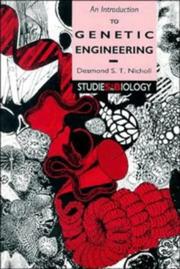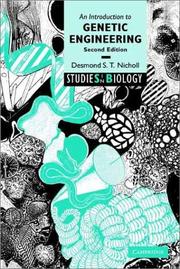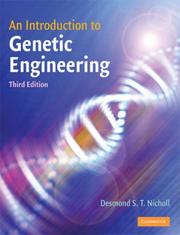| Listing 1 - 5 of 5 |
Sort by
|

ISBN: 0521436346 0521430542 9780521436342 Year: 1994 Publisher: Cambridge Cambridge University press
Abstract | Keywords | Export | Availability | Bookmark
 Loading...
Loading...Choose an application
- Reference Manager
- EndNote
- RefWorks (Direct export to RefWorks)
microbiologie --- genetische manipulatie --- klonen --- transgeen dier --- dna --- genomes --- S10/0230 --- China: Economics, industry and commerce--General works and economic history: 1911 - 1949 --- Genetic engineering --- 575.08:577.21 --- 575.08:577.21 Genetic engineering, genetic manipulation, recombinant DNA --- Genetic engineering, genetic manipulation, recombinant DNA --- Designed genetic change --- Engineering, Genetic --- Gene splicing --- Genetic intervention --- Genetic surgery --- Genetic recombination --- Biotechnology --- Transgenic organisms --- S04/0810 --- S04/0820 --- S11/0460 --- S11/0493 --- S11/0534 --- China: History--General: 1911 - 1928 --- China: History--1928 - 1937 --- China: Social sciences--Cities: 1840 - 1949 --- China: Social sciences--Society: 1911 - 1949 --- China: Social sciences--Class studies --- genetica --- moleculaire biologie --- Molecular biology --- Genetics --- Genetic engineering. --- genetic engineering --- Plant breeding --- cloning --- ADN --- DNA --- methods --- DNA.

ISBN: 0521808677 0521004713 9780521004718 9781139168205 9780521808675 Year: 2002 Publisher: Cambridge : Cambridge University Press,
Abstract | Keywords | Export | Availability | Bookmark
 Loading...
Loading...Choose an application
- Reference Manager
- EndNote
- RefWorks (Direct export to RefWorks)
Des Nicholl presents here a fully revised, and expanded edition of his popular undergraduate-level textbook. Many of the features of the original edition have been retained; the book still offers a concise technical introduction to the subject of genetic engineering. However, the book is now divided into three main sections: the first introduces students to basic molecular biology, the second section explains the methods used to manipulate genes, and the third deals with modern applications of genetic engineering. A whole chapter is now devoted to the polymerase chain reaction. Applications covered in the book include genomics, protein engineering, gene therapy, cloning, and transgenic animals and plants. A final chapter discusses the ethical questions surrounding genetic engineering in general.
Genetic engineering. --- Genetic engineering --- 575 --- Genetica --- Genetische biologie --- Genetische manipulatie --- Designed genetic change --- Engineering, Genetic --- Gene splicing --- Genetic intervention --- Genetic surgery --- Genetic recombination --- Biotechnology --- Transgenic organisms --- genetische engineering (manipulatie) --- moleculaire biologie --- génie génétique (ingénierie génétique) --- biologie moléculaire --- Molecular genetics. --- Transformation, genetic

ISBN: 9780511800986 9780521850063 9780521615211 9780511649899 0511649894 9780511402449 0511402449 9780511404184 0511404182 9780511399640 0511399642 9780511398582 0511398581 0521850061 0521615216 0511800983 1107086264 1107175941 0511568053 Year: 2008 Publisher: Cambridge Cambridge University Press
Abstract | Keywords | Export | Availability | Bookmark
 Loading...
Loading...Choose an application
- Reference Manager
- EndNote
- RefWorks (Direct export to RefWorks)
In this third edition of his popular undergraduate-level textbook, Des Nicholl recognises that a sound grasp of basic principles is vital in any introduction to genetic engineering. Therefore, the book retains its focus on the fundamental principles used in gene manipulation. It is divided into three sections: Part I provides an introduction to the relevant basic molecular biology; Part II, the methods used to manipulate genes; and Part III, applications of the technology. There is a new chapter devoted to the emerging importance of bioinformatics as a distinct discipline. Other additional features include text boxes, which highlight important aspects of topics discussed, and chapter summaries, which include aims and learning outcomes. These, along with key word listings, concept maps and a glossary, will enable students to tailor their study to suit their own learning styles and ultimately gain a firm grasp of a subject that students traditionally find difficult.
Genetic engineering. --- Designed genetic change --- Engineering, Genetic --- Gene splicing --- Genetic intervention --- Genetic surgery --- Genetic recombination --- Biotechnology --- Transgenic organisms
Book
ISBN: 9781009180603 9781009180597 Year: 2023 Publisher: Cambridge, United Kingdom ; New York, NY : Cambridge University Press,
Abstract | Keywords | Export | Availability | Bookmark
 Loading...
Loading...Choose an application
- Reference Manager
- EndNote
- RefWorks (Direct export to RefWorks)
"The fourth edition of this accessible and broad-based introduction to genetic engineering is fully updated with all the most recent developments in bioethics, sequencing technology and genome editing. It includes a comprehensive suite of learning resources including reading lists, web-search activities, key word lists and concept maps"--
Book
ISBN: 0511555393 1139168207 0511648677 0511336241 0511336896 Year: 2002 Publisher: Cambridge : Cambridge University Press,
Abstract | Keywords | Export | Availability | Bookmark
 Loading...
Loading...Choose an application
- Reference Manager
- EndNote
- RefWorks (Direct export to RefWorks)
Des Nicholl presents here a new, fully revised, and expanded edition of his popular undergraduate-level textbook. Many of the features of the original edition have been retained; the book still offers a concise technical introduction to the subject of genetic engineering. However, the book is now divided into three main sections: the first introduces students to basic molecular biology, the second section explains the methods used to manipulate genes, and the third deals with modern applications of genetic engineering. A whole chapter is now devoted to the polymerase chain reaction. Applications covered in the book include genomics, protein engineering, gene therapy, cloning, and transgenic animals and plants. A final chapter discusses the ethical questions surrounding genetic engineering in general. An Introduction to Genetic Engineering is essential reading for undergraduate students of biotechnology, genetics, molecular biology and biochemistry.
| Listing 1 - 5 of 5 |
Sort by
|

 Search
Search Feedback
Feedback About UniCat
About UniCat  Help
Help News
News